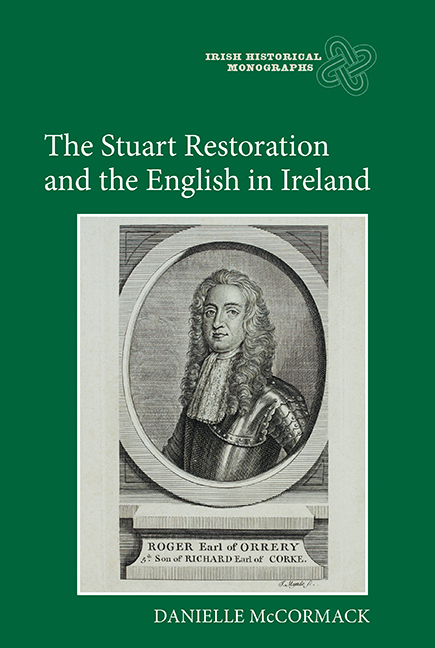Book contents
- Frontmatter
- Contents
- Miscellaneous Frontmatter
- Acknowledgements
- List of abbreviations and conventions
- Introduction
- 1 The political and mental map of 1660s Ireland
- 2 Stuart restoration and the beginnings of Protestant discontent
- 3 Roger Boyle, earl of Orrery, and the evolution of English Protestant identity in Ireland
- 4 Moral and rhetorical challenges to Protestant power
- 5 Charles II and his ministers in Ireland
- 6 The court of claims, popery and Stuart authority
- Conclusion
- Bibliography
- Index
4 - Moral and rhetorical challenges to Protestant power
Published online by Cambridge University Press: 05 July 2016
- Frontmatter
- Contents
- Miscellaneous Frontmatter
- Acknowledgements
- List of abbreviations and conventions
- Introduction
- 1 The political and mental map of 1660s Ireland
- 2 Stuart restoration and the beginnings of Protestant discontent
- 3 Roger Boyle, earl of Orrery, and the evolution of English Protestant identity in Ireland
- 4 Moral and rhetorical challenges to Protestant power
- 5 Charles II and his ministers in Ireland
- 6 The court of claims, popery and Stuart authority
- Conclusion
- Bibliography
- Index
Summary
In July 1661, the deposition of Edward Eyres, the Protestant recorder of Galway city who had settled there in the 1650s, was read before the House of Commons. Eyres deposed that the former possessor of his house, Robert Martin(e) of Ross, with his son-in-law, Isodorous Lynch, came to him to conclude some business. This proceeded on an amicable basis. Before departing, however, Martin asked in a ‘jesting Manner’ what Eyres would say should he be restored to the property. Eyres responded that he would ask to remain as a tenant, but followed this up with an understandable anxiety to know the source of Martin's confidence that he would be restored. Martin declared that he had ‘an order in my Pocket from the King’ to be restored to it. Upon hearing that it was not sealed by the lords justices, Eyres aggressively derided its worth, stating that it would not be worth ‘threepence’ to Martin. Martin exploited his rival's rash words, representing them as an ‘Undervaluation of the Kings Authority'’ and, as such, high treason. Ultimately, Eyres was acquitted by the Commons.
This bizarre case hints at several aspects of the political fabric of early restoration Ireland in relation to the resurgence of the Catholic interest. It demonstrates the renewed confidence and hopes of Catholics that they would once again enjoy their estates. It points to the effect of royal grants in nurturing these hopes, but equally demonstrates that they were worth rather little, as indeed Eyres indicated. However, the case also illuminates the insecurity of the linguistic hegemony of the English Protestant interest, as Catholics sought to use the language of monarchical loyalty for their own ends.
In the early years of the restoration, Catholic political activity created a sense of encirclement for Protestants, who were faced with the threat that renewed Catholic political confidence posed. Catholics challenged Protestant power in both formal and informal settings, making use of oratory, print, verbal challenge and outright violence. The contours of the Catholic challenge crossed these instruments, and was furthered jointly and severally by members of a variety of social orders. Oratory and print was generally the preserve of the privileged and literate.
- Type
- Chapter
- Information
- The Stuart Restoration and the English in Ireland , pp. 75 - 106Publisher: Boydell & BrewerPrint publication year: 2016



